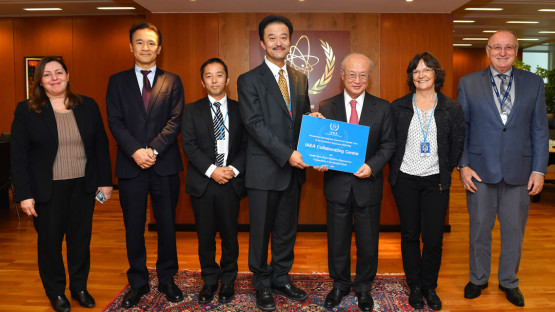Healthcare professionals, academics and students of nuclear medicine and radiation oncology from around the world will have more opportunities to benefit from increased collaboration between the IAEA and the Hiroshima International Council for Health Care of the Radiation-Exposed (HICARE) after this consortium was re-designated as an IAEA Collaborating Centre last month.
IAEA Director General Yukiya Amano presented HICARE representatives with a plaque, designating HICARE as a Collaborating Centre for the second time, on 3 November. The re-designation period will last until April 2021.
“Thanks to the re-designation, productive collaboration with the IAEA will continue,” said May Abdel-Wahab, Director of the Division of Human Health at the IAEA. “There will be a wide range of activities, including regional education and training workshops in radiotherapy, biodosimetry research and curriculum development in radiation disaster medicine.”
Projects will include epidemiological and molecular studies on radiation-induced cancers, systemic consequences of radiotherapy treatment such as abscopal (or out-of-field effects), and second tumours that arise as a result of treatment (in- and out-of-field) and radiological and non-radiological consequences of the Fukushima accident.
“There will be emphasis on education and training in advanced radiotherapy techniques, such as intensity modulated radiation therapy (IMRT) and stereotactic body radiation therapy (SBRT), which will continue to provide support for regional radiation oncologists and disseminate knowledge of novel techniques in radiotherapy,” Abdel-Wahab said. For more on these techniques and related new IAEA guidelines, see this article.
Under the agreement, Hiroshima University, one of the main institutions of HICARE, will sponsor the participation of its students in the IAEA’s internship programme.
Since it was first designated as an IAEA Collaborating Centre in 2014, HICARE has coordinated international and regional IAEA training workshops for the education and training of 26 radiation oncologists on cancer treatment utilizing novel and advanced radiotherapy technologies. It has also supported the participation of experienced HICARE professionals in two IAEA coordinated research projects on biodosimetry and contributed to increased capacity building of health professionals in radiation disaster medicine through collaboration in the Phoenix Leader Education Programme.




